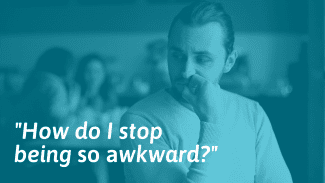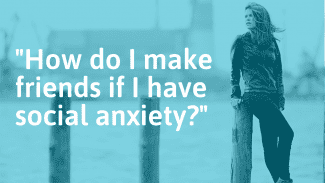Everyone makes mistakes. That’s a fact of life. But people differ in how long we hold on to our mistakes, how we perceive them, and how tortured we are by them.
Some people view mistakes as opportunities to learn and grow. Every failure is a possibility for change. Others refuse to consider that they’ve made a mistake, preferring to distract themselves from the pain. And some people lay awake at night going over embarrassing memories from ten years ago. The list of failures seems impossibly long. It can be a challenge to focus on anything else.
Do you identify with that last group of people? Are painful memories of awkward encounters difficult to let go of? You can learn how to let go of small mistakes. Ideally, you will follow these steps to achieve the best results: forgiving yourself and moving on.
1. Focus on your breath to help you stay calm
When we have challenging memories or thoughts come up, one problem is that we are either swept away by them or try to fight them.
Say you remember that time you were unprepared for a lecture at work, stammered in front of everyone, and couldn’t answer questions correctly. Most people act in one or both of the reactive ways: either going over the details of the event while berating themselves or telling themselves to stop thinking about it.
Neither of these methods leaves us feeling any better.
Instead, try focusing on your breath. Studies show that slow breathing techniques can significantly improve measures of anxiety.[1] One easy practice is to breathe through your nose as you slowly count to four. Feel the air feel your belly. Hold your breath for a moment and then slowly breathe out, again counting to four.
When thoughts appear, just refocus your attention on your breathing. Don’t fight your thoughts, but try not to get caught up in them, either. This type of practice is the basis of what is known as a mindfulness practice.
2. Notice what you feel in your body
After your body starts to feel a bit more relaxed after a few rounds of breathing, it’s time for the next step.
Slowly scan your body and try to pay attention to any sensations you feel. Start from your feet and slowly go over the rest of your body. You can use a guided audio meditation to help you focus.
As you scan your body, you may notice that some regions of your body tense as you think of your past mistake or embarrassing moment. Your hands may feel like they want to clench, or you may catch your heart beating faster.
Sometimes surprising things come up. There may be a color or shape that comes up when you bring the focus to your body. Try not to judge your thoughts. Let them come and go.
3. Let yourself feel your emotions
When we think of past mistakes, we tend to get caught up in the story.
“I should have acted differently. I’m so stupid! She must think I’m a jerk. No wonder I can’t stay in a relationship for the long-term.”
And on and on we go.
As we focus on the story, we ignore our feelings. After focusing on your body’s sensations, try to give a name to the emotion associated with the memory.
You may be feeling frustrated, confused, ashamed, guilty, sad, panicked, insecure, or disgusted. All of these feelings (or any other emotions you may be having) are normal.
Note that things like “stupid,” “wrong,” and so on aren’t emotions but judgments. They’re part of the stories our mind is telling us. Stories can be interesting, and they can tell us a lot about ourselves and the world we live in. But it’s important to remember that they’re just stories and not an objective truth.
4. Understand what went wrong
After giving space for your emotions, you can now go over the event more calmly and examine it.
Try not to beat yourself up for your mistake. Instead, examine the events leading up to it. Who said what? What was going on around you? Consider what you were thinking and feeling at the time.
Filling in the blanks will help you come up with explanations. Perhaps you thought the person you were talking to was joking and missed the signs that they were looking for support? Maybe you were tired, hungry, and distracted. You may have missed social cues. Examining the situation without judgment can help you learn from it.
5. Imagine what you would do differently
After you’ve considered why you reacted the way you did, you can try to imagine how you could have responded differently. Coming up with better solutions makes it less likely that you will repeat the same mistake in the future.
And once your mind considers the matter “solved,” it won’t need to keep bringing up this same event. If it does, you can remind yourself, “That was in the past, and I’ve learned from it.”
If you need help imagining how to react to awkward situations in the moment, read our guide: dealing with embarrassing and awkward situations.
6. Remember that you did your best
When you find yourself beating yourself up for past mistakes, it may help to speak kindly to yourself.
When we go over past mistakes in our minds, we tend to judge ourselves harshly. We think things like, “I should have known better.” “I never get things right.” “I always make these kinds of mistakes.”
Instead of saying these harsh things to yourself, try telling yourself:
- I didn’t know any better.
- I tried my best with the knowledge I had.
- I made a mistake.
- I didn’t know any better.
- I learned a lot.
Positive self-talk isn’t an excuse to avoid learning new skills. But beating ourselves up isn’t an effective method to get ourselves to change. Praise and positive reinforcement are shown to be more effective in achieving change and do not have a negative effect on our internal motivation for change.[2]
7. Remind yourself of your successes
You’re not just a person who made a mistake. You have many other positive qualities, and there is nothing wrong with reminding yourself of them.
It may help you to keep an ongoing list of accomplishments and positive qualities you have. When you do something that makes you feel good, write it down in a notebook. It can be the fact that you got one of the best grades on a test, that your coworker paid you a compliment, or that you helped a neighbor by doing their shopping when they were sick. Write down as many things as you can, small and big.
When you find yourself beating yourself up, go over this notebook and remind yourself of the good moments in your life. This will help you forgive yourself and move on.
8. Make a plan and start making changes
After considering what went wrong, think about how you can avoid making similar mistakes in the future.
Were you distracted because you were trying to talk and text at the same time? Put the phone down when you speak to others in the future.
Does it seem like you come across as rude due to your tone and body language? Read up and practice how to look more approachable and how to get comfortable making eye contact in conversation.
If your social anxiety or depression are getting in the way of your social interactions, take steps to find a therapist or support group.
9. Apologize if necessary
Bringing up old mistakes can be really intimidating. After all, we want others to forget about them.
But getting closure on events that bother you makes them less likely to keep coming up.
You can say something like, “I’ve been thinking about that time you told me about your fear of heights. I realize I was quite insensitive about it back then. I’m sorry for how I reacted. I understand that you may have felt unsupported.”
Your friend will probably appreciate your acknowledgment. You may find out that the other person doesn’t actually remember your mistake. In any case, an apology isn’t just for them – it’s for you as well.
Of course, there’s no need to bring up every embarrassing memory that comes to mind. There’s no need to contact someone who you haven’t talked to in 20 years to apologize for stealing their toy in kindergarten.
Common questions about letting go of mistakes
How do I stop worrying about mistakes?
Remind yourself that you will make mistakes sooner or later. Just like you can like people even though they make mistakes, you aren’t worth any less when you make mistakes. Let yourself learn from your mistakes instead of beating yourself up.








